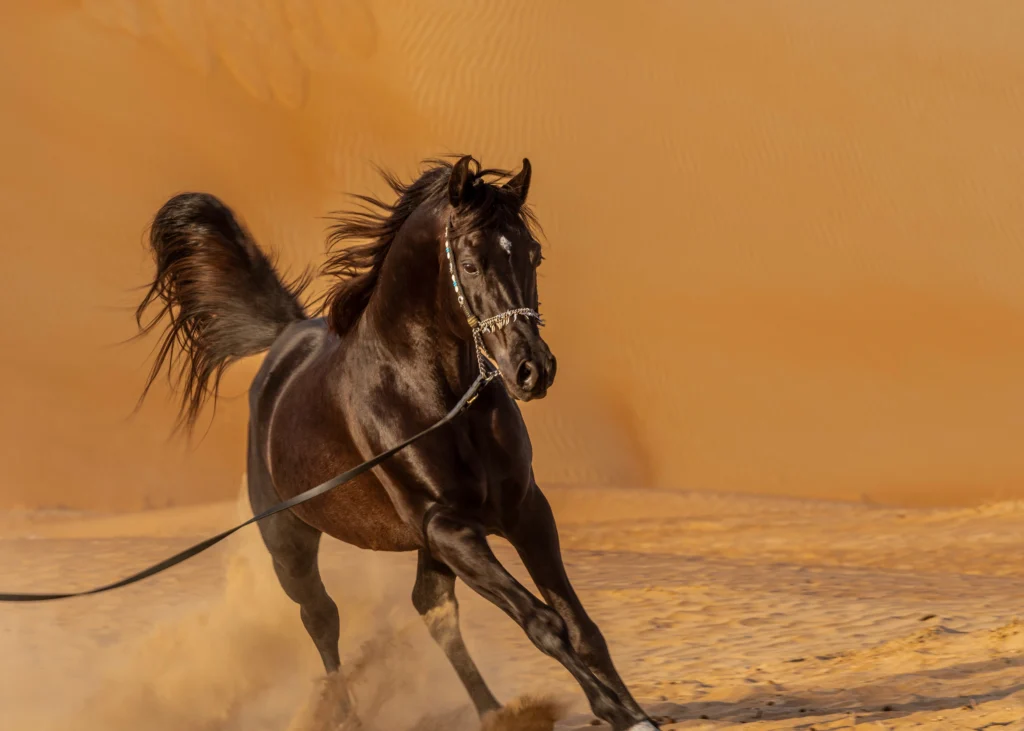Venturing into the vast expanse of golden dunes atop a majestic Arabian horse creates an experience that transcends ordinary travel. Arabian horse safaris combine the thrill of exploration with the deep connection between rider and horse that has defined human history for millennia. This immersive journey allows travelers to discover breathtaking landscapes and ancient cultures while forming a bond with one of the world’s most distinguished equine breeds.
The Allure of Arabian Horse Safaris
Arabian horse safaris represent the perfect marriage of adventure and elegance. These remarkable experiences take you beyond traditional tourism, offering an authentic connection to both nature and cultural heritage. Whether you’re galloping across shifting sands or navigating rocky mountain trails, horseback riding vacations centered around Arabian horses provide a unique perspective impossible to achieve through conventional travel.
The Arabian horse, with its distinctive profile, incredible endurance, and gentle temperament, makes the perfect companion for these journeys. Bred for centuries to thrive in challenging desert environments, these horses possess the stamina and sure-footedness necessary for extended rides through varied terrain. Their intelligence and willingness to form relationships with humans enhance the quality of horse riding tours, creating memories that last a lifetime.

What Makes Arabian Horse Safaris Unique?
Unlike standard horseback riding experiences, Arabian horse safaris immerse you in environments where these magnificent creatures have roamed for generations. Desert horse safari adventures often follow ancient trade routes and nomadic pathways, allowing modern travelers to experience landscapes much as they would have appeared centuries ago.
These equestrian safaris typically feature:
- Expert guides with deep knowledge of local terrain and culture
- Carefully selected Arabian horses matched to rider experience levels
- Authentic cultural interactions with local communities
- Accommodations ranging from luxury desert camps to traditional lodgings
- Cuisine reflecting regional specialties and traditions
- Opportunities to witness wildlife in natural habitats
- Spectacular stargazing in remote locations
Horse riding holidays centered around Arabian horses offer varying degrees of challenge and comfort. Some operators cater to experienced equestrians seeking rigorous horse trekking tours across challenging terrain, while others welcome novice riders with gentler itineraries focused on shorter daily rides and more leisure time.
Popular Destinations for Arabian Horse Riding Adventures
The Middle Eastern Heartland
The Arabian Peninsula represents the ancestral home of the Arabian horse breed and offers some of the most authentic desert horseback riding experiences available. Countries like Jordan, Oman, and the United Arab Emirates feature established horse safari tours that combine riding with cultural immersion.
In Jordan, equestrian travel often includes rides through the stunning red sandstone landscape of Wadi Rum, where riders can follow routes used by Lawrence of Arabia. Omani horse riding expeditions frequently explore the dramatic Hajar Mountains and coastal regions, while UAE-based horseback riding trips might include gallops across the expansive Empty Quarter desert.
North African Expeditions
Morocco and Egypt offer compelling horseback riding vacations that combine Arabian horse traditions with unique landscapes and architectural wonders. Moroccan horse riding tours often traverse the Atlas Mountains, ancient villages, and Atlantic coastline, creating varied riding experiences within a single journey.
Egyptian horseback riding experiences frequently center around the Pyramids of Giza and the Western Desert, allowing riders to connect with the ancient world from the saddle of a horse breed that has been revered since pharaonic times.
European Arabian Experiences

For those seeking Arabian horse safaris without long-haul travel, Spain and southern France offer excellent alternatives. The Iberian Peninsula’s deep historical connections to Arabian horse breeding have created a legacy of exceptional horseback riding holidays featuring these elegant animals.
Andalusian equestrian safaris often explore the region’s diverse landscapes, from mountain ranges to Mediterranean shores, while integrating cultural experiences related to Spain’s Moorish heritage. French horse riding adventures frequently focus on the Camargue region, home to distinctive white horses with Arabian influence.
What to Expect on an Arabian Horse Safari
Daily Routines
The rhythm of Arabian horse safaris typically follows the natural patterns of desert environments. Early mornings and late afternoons offer prime riding times, avoiding the midday heat when both horses and riders rest. Horse riding excursions generally cover between 15-30 miles daily, depending on terrain and experience levels.
A typical day on an Arabian horse safari might include:
- Early morning breakfast as the sun rises
- 3-4 hours of morning riding
- Extended lunch and rest period during peak heat
- 2-3 hours of afternoon/evening riding
- Dinner and socializing around a campfire
- Overnight in tents, lodges, or local accommodations
These horseback riding holidays balance riding time with opportunities to explore landscapes on foot, interact with local communities, or simply relax and absorb the surroundings. The focus remains on forging meaningful connections with your horse and experiencing environments at a pace and perspective impossible through motorized travel.
Accommodation and Meals
Accommodations on Arabian horse safaris vary widely based on location and operator. Options range from luxury desert camps with private tents and en-suite facilities to authentic homestays with local families. Many equestrian vacations feature a mix of accommodation styles throughout the journey.
Meals during horse safari tours typically highlight local cuisine prepared with fresh ingredients. These dining experiences often become highlights of the trip, particularly when featuring traditional cooking methods or special regional dishes. Many operators pride themselves on showcasing authentic culinary traditions as part of the immersive cultural experience.
Preparing for Your Arabian Horse Safari
Physical Readiness

While Arabian horse safaris accommodate various skill levels, basic physical fitness enhances enjoyment of these horseback riding holidays. Core strength and leg conditioning help prevent soreness during long days in the saddle. Simple exercises like planks, squats, and regular walking prepare your body for the demands of extended riding.
For those new to horseback riding experiences, taking a few lessons before departure helps build confidence and basic skills. Even experienced riders benefit from refresher training, particularly if they haven’t ridden regularly in recent months.
Packing Essentials
Proper gear contributes significantly to comfort during horse riding adventures. Essential items include:
- Helmet (many operators provide these, but bringing your own ensures proper fit)
- Riding boots with a heel
- Multiple pairs of riding pants or jeans
- Moisture-wicking shirts and layers for temperature changes
- Wide-brimmed hat for sun protection during breaks
- High-SPF sunscreen and lip protection
- Bandana or buff for dust protection
- Comfortable clothing for evenings
- Small day pack for carrying water and essentials while riding
Most Arabian horse safari operators provide detailed packing lists tailored to their specific region and season. Weather conditions in desert environments can change dramatically between day and night, making layered clothing essential for comfort.
The Arabian Horse: Your Safari Companion
The success of any horse riding safari depends largely on the quality and temperament of your equine partner. Arabian horses bring several advantages to these adventures:
Endurance and Adaptability
Arabian horses evolved in harsh desert conditions, developing remarkable stamina and efficiency of movement. Their natural endurance makes them ideal for long-distance horse trekking tours across challenging terrain. These horses can maintain steady paces for hours while remaining alert and responsive.
Their efficient metabolism allows them to thrive with less water and food than many other breeds, an essential quality for remote horseback riding trips where resources may be limited. This evolutionary adaptation means Arabian horses maintain energy and condition throughout extended journeys.
Intelligence and Temperament
Arabian horses are known for their quick learning and problem-solving abilities. Their intelligence makes them responsive to rider cues and capable of navigating difficult terrain safely. This breed typically forms strong bonds with handlers, creating partnerships that enhance the quality of equestrian travel experiences.
While spirited, properly trained Arabian horses used for horse safari tours demonstrate remarkable patience and willingness to work with riders of various experience levels. Their natural curiosity and forward movement contribute to engaging riding experiences across diverse landscapes.
Cultural Significance
Riding an Arabian horse through historic regions adds depth to horseback riding vacations. These animals have shaped human history through their roles in warfare, trade, agriculture, and transportation. Their presence in art, literature, and cultural traditions spans continents and centuries.
Many horse riding tours include educational components about Arabian horse history and the breed’s influence on local culture. This context enriches the journey, connecting riders to generations of horse-human partnerships and regional traditions.
Types of Arabian Horse Safari Experiences
Desert Horse Safaris

Desert environments provide the classic setting for Arabian horse safaris. These horseback riding experiences traverse sand dunes, rocky plateaus, and ancient dried riverbeds. The stark beauty of desert landscapes creates dramatic backdrops for riding adventures, with ever-changing light and terrain keeping each day fresh and exciting.
Desert horse safari itineraries often follow traditional caravan routes or nomadic migration paths, incorporating historical context into the journey. The absence of modern development in many desert regions allows riders to experience landscapes much as they would have appeared centuries ago.
Mountain and Valley Expeditions
Arabian horses demonstrate remarkable sure-footedness in varied terrain, making them excellent partners for mountain horseback riding trips. These equestrian vacations typically explore higher elevation regions with cooler temperatures and diverse ecosystems.
Mountain-based horse riding adventures often incorporate dramatic elevation changes, providing riders with ever-changing perspectives and vegetation zones. The physical challenge of mountain terrain creates a more technical riding experience while offering spectacular vistas as rewards.
Coastal Horse Riding Tours
Some of the most visually stunning Arabian horse safaris combine desert riding with coastal exploration. These horseback riding experiences might include gallops along empty beaches, rides through coastal dunes, or journeys through seaside villages.
Coastal horse riding holidays offer refreshing water access during hot weather and opportunities to observe marine ecosystems. The contrast between arid landscapes and ocean views creates memorable visual experiences unique to coastal equestrian safaris.
Cultural Immersion Through Horseback Travel
Arabian horse safaris offer meaningful connections to local cultures and traditions. These horseback riding tours frequently include:
Traditional Horsemanship Demonstrations
Many equestrian vacations feature demonstrations of regional riding styles and training methods. These presentations highlight the unique relationships between local communities and Arabian horses, showcasing skills developed over generations.
Observing expert horsemanship provides insights into cultural values and traditions while offering practical techniques riders can incorporate into their own relationship with horses. Some horse riding holidays include basic instruction in traditional riding methods as part of the experience.
Village Visits and Local Interactions
Horse safari tours typically incorporate visits to rural communities off standard tourist routes. Arriving on horseback creates different interactions than conventional tourism, often opening doors to more authentic exchanges and hospitality.
These cultural encounters may include shared meals, craft demonstrations, musical performances, or opportunities to observe daily life activities. The slower pace of horse riding adventures allows meaningful connections impossible during rushed conventional tourism.
Historical Site Access
Many significant historical sites lie off paved roads in remote areas, making horseback riding experiences ideal for heritage exploration. Arabian horse safaris often incorporate archaeological sites, ancient trading posts, rock art locations, or historical forts into their itineraries.
Approaching these sites on horseback provides context missing from conventional visits, helping travelers understand historical transportation challenges and strategic positioning. Many horse trekking tours include expert guides who bring these locations to life through stories and historical context.
Environmental Benefits of Equestrian Travel
Choosing Arabian horse safaris represents environmentally conscious tourism with several advantages over mechanized travel options:
Minimal Environmental Impact
Horses leave significantly lighter environmental footprints than vehicles, particularly in fragile desert ecosystems where tire tracks can remain visible for decades. Horse riding holidays use existing trails that blend naturally into landscapes rather than requiring constructed roads.
Equestrian safaris typically operate with lower resource consumption than conventional tours, reducing water usage, eliminating fuel requirements, and minimizing waste production. Many horse safari tours emphasize leave-no-trace principles, carrying out all waste and minimizing environmental disruption.
Wildlife Viewing Advantages
Wildlife responds differently to horses than to vehicles, often allowing closer approaches and more natural behavior observation. Many animals perceive horses and riders as single entities, reducing their flight response compared to engine noise and vehicle movement.
Horse riding expeditions move at speeds that enhance wildlife spotting opportunities, allowing time to notice subtle movements or camouflaged species. The elevated perspective from horseback improves sightlines across varied terrain, enhancing animal viewing possibilities.
Sustainable Tourism Support
Many Arabian horse safari operations directly support sustainable livelihoods in remote communities. These horseback riding vacations create employment for local guides, horse handlers, cooks, and accommodation providers while preserving traditional skills and knowledge.
By maintaining economic value for horsemanship traditions, these equestrian vacations help preserve cultural heritage that might otherwise disappear. Many operators invest in local conservation initiatives and community development projects, creating positive impacts beyond immediate tourism activities.
Choosing the Right Arabian Horse Safari
With increasing popularity of horseback riding experiences worldwide, selecting the appropriate Arabian horse safari requires consideration of several factors:
Experience Level Requirements
Horse riding adventures vary significantly in technical difficulty and physical demands. Beginner-friendly equestrian safaris feature shorter daily rides, more predictable terrain, and horses selected specifically for their patience with novice riders.
Advanced horse riding expeditions might include challenging terrain, faster paces, and longer days in the saddle. These experiences typically require several years of regular riding experience and comfort with various riding skills.
Most operators clearly indicate minimum experience requirements and offer options for mixed-ability groups. Some horse safari tours provide opportunity to improve skills with instruction during the journey, while others assume established riding capability.
Trip Duration and Intensity
Arabian horse safaris range from weekend excursions to multi-week expeditions. Shorter horseback riding holidays might focus on specific regions or landscape features, while extended horse trekking tours cover diverse environments and cultural areas.
Trip intensity varies independently from duration, with some operators offering relaxed itineraries with shorter daily riding times and others maximizing saddle hours. Understanding the balance between riding time and cultural activities helps select experiences aligned with personal preferences.
Climate Considerations
Desert environments experience extreme temperature variations both seasonally and daily. Arabian horse safaris operate year-round in many regions, but seasonal timing significantly impacts the experience. Winter departures offer cooler riding conditions but might include cold nights, while shoulder seasons provide moderate temperatures with fewer tourists.
Each region features optimal weather windows that balance comfortable temperatures with landscape conditions. Research typical weather patterns before booking horseback riding vacations, particularly for desert horse safari adventures where heat management affects safety and enjoyment.
Health and Safety on Arabian Horse Safaris
Reputable operators prioritize rider and horse welfare throughout equestrian safari experiences. Common safety practices include:
Rider Assessment and Horse Matching
Quality horse riding tours begin with honest evaluation of each participant’s experience and physical condition. This assessment allows guides to match riders with appropriate horses based on temperament, responsiveness, and movement style.
The rider-horse partnership significantly impacts both safety and enjoyment of horse riding adventures. Experienced operators recognize this relationship’s importance and may reassign horses during initial riding days if matches prove less than optimal.
Guide Qualifications
Professional horse safari tours employ guides with extensive knowledge of both horsemanship and local conditions. These experts typically possess wilderness first aid certification, navigation skills, and mechanical horse care abilities for tack adjustments or emergency repairs.
Many guides on Arabian horse safaris come from local communities with generational equestrian knowledge, providing cultural insights alongside practical expertise. Their understanding of horse behavior and environmental conditions creates safer experiences for all participants.
Emergency Preparations
Responsible operators maintain comprehensive emergency response plans for horseback riding vacations, including communication systems, evacuation procedures, and first aid protocols. Support vehicles often accompany horse riding expeditions, carrying supplies and providing assistance if needed.
Medical questionnaires before departure help operators prepare for individual needs and potential concerns. Many equestrian safari companies require travel insurance with emergency evacuation coverage as a booking condition.
The Transformative Impact of Arabian Horse Safaris
Beyond spectacular landscapes and cultural experiences, Arabian horse safaris often create profound personal impacts on participants. Regular feedback from these horseback riding holidays includes:
Reconnection with Natural Rhythms
Extended time on horseback naturally aligns travelers with sunrise-to-sunset patterns and reduced digital distractions. This return to natural cycles often produces significant stress reduction and mental clarity reported by horse safari tour participants.
The partnership with horses requires present-moment awareness incompatible with modern multitasking tendencies. Many riders describe this focused attention as meditative and restorative, providing benefits extending beyond the vacation period.
Perspective Shifts
Traversing vast landscapes on horseback frequently alters perspectives on distance, time, and human place within natural environments. These horse riding adventures demonstrate both human capability and our dependence on animal partnerships and natural resources.
Many participants report renewed appreciation for simple comforts and reduced attachment to material possessions following equestrian safaris. These perspective shifts sometimes initiate significant life changes regarding work-life balance, consumption patterns, or relationship priorities.
Confidence Building
Successfully completing challenging horseback riding experiences builds self-confidence applicable to other life areas. Learning to communicate effectively with horses, adapt to changing conditions, and overcome physical challenges creates lasting impacts on personal capability beliefs.
For many participants, Arabian horse safaris represent personal achievements that redefine perceived limitations. The combination of physical accomplishment and cultural immersion creates powerful memories that continue providing benefits long after the journey ends.
Planning Your Arabian Horse Safari Adventure
Best Seasons for Arabian Horse Safaris
Optimal timing for horse riding holidays varies by region:
- Middle Eastern desert horse safari experiences typically operate October through April, avoiding summer heat extremes
- Moroccan horse riding adventures offer year-round options, with inland routes best in spring/fall and coastal regions comfortable through summer
- European Arabian horse safaris concentrate in May through September when weather conditions favor outdoor activities
Research destination-specific climate patterns when planning equestrian vacations, paying particular attention to both temperature and precipitation patterns that might affect trail conditions.
Booking Timeline
Popular Arabian horse safaris often fill 6-12 months in advance, particularly for peak season departures. Early booking ensures participation in preferred itineraries and may access early reservation discounts offered by many operators.
Last-minute availability occasionally occurs through cancellations, but relying on these opportunities limits choices and often eliminates preferred date options. Advance planning allows thorough preparation, including any conditioning exercises recommended by operators.
Budget Considerations
Arabian horse safaris represent significant investments, with pricing reflecting the extensive logistics, quality horses, and support systems required for safe operations. Cost variables include:
- Destination (European options typically cost more than Middle Eastern or North African experiences)
- Accommodation quality (luxury desert camps command premium prices compared to traditional lodging)
- Trip duration (longer journeys often offer better value per day)
- Group size (smaller groups generally command higher prices but provide more personalized experiences)
- Inclusions (airport transfers, pre/post accommodations, cultural activities)
Many operators offer tiered pricing options catering to different budget requirements while maintaining essential safety standards and horse welfare considerations.
Conclusion: The Lasting Magic of Arabian Horse Safaris
Arabian horse safaris offer far more than typical vacation experiences. These horseback riding adventures connect travelers to ancient traditions, spectacular landscapes, and meaningful cultural exchanges while fostering personal growth and environmental appreciation. The unique partnership between rider and Arabian horse creates an immersive journey impossible to replicate through conventional travel.
Whether galloping across endless desert dunes, traversing mountain trails, or exploring coastal pathways, these equestrian safaris provide perspectives inaccessible to vehicular tourists. The rhythmic movement of horseback travel, combined with the intelligence and spirit of Arabian horses, creates journeys that engage all senses and leave indelible memories.
For those seeking authentic connections to landscape, culture, and self, Arabian horse safaris represent ideal adventure choices. These horse riding expeditions continue ancient traditions of equestrian exploration while incorporating modern safety standards and comfort considerations. The result transforms ordinary tourism into extraordinary journey, creating stories that last lifetimes.
Additional Resources for Arabian Horse Safari Planning
For those interested in exploring Arabian horse safaris further, these resources provide valuable information:
- International Association of Equestrian Tourism – Global standards and operator listings for horseback riding vacations
- Arabian Horse Association – Information about Arabian horses and their unique characteristics
- Equitrekking – Destination guides and reviews for horse riding holidays worldwide
- World Nomads – Travel insurance options covering horseback riding adventures
For pet care information before your equestrian journey, visit PetsPump for comprehensive guides on arranging pet care during travel. Their articles on preparing pets for your absence and choosing boarding options prove particularly helpful for horse safari participants.
Remember: Arabian horse safaris combine adventure, cultural immersion, and personal challenge in unique ways. Whether you’re an experienced equestrian or first-time rider, these journeys offer authentic connections to landscapes, traditions, and remarkable horses that define some of humanity’s most ancient partnerships.






